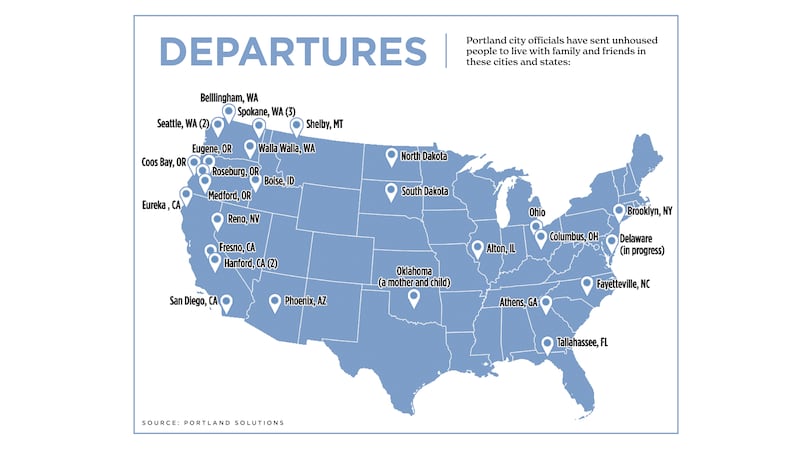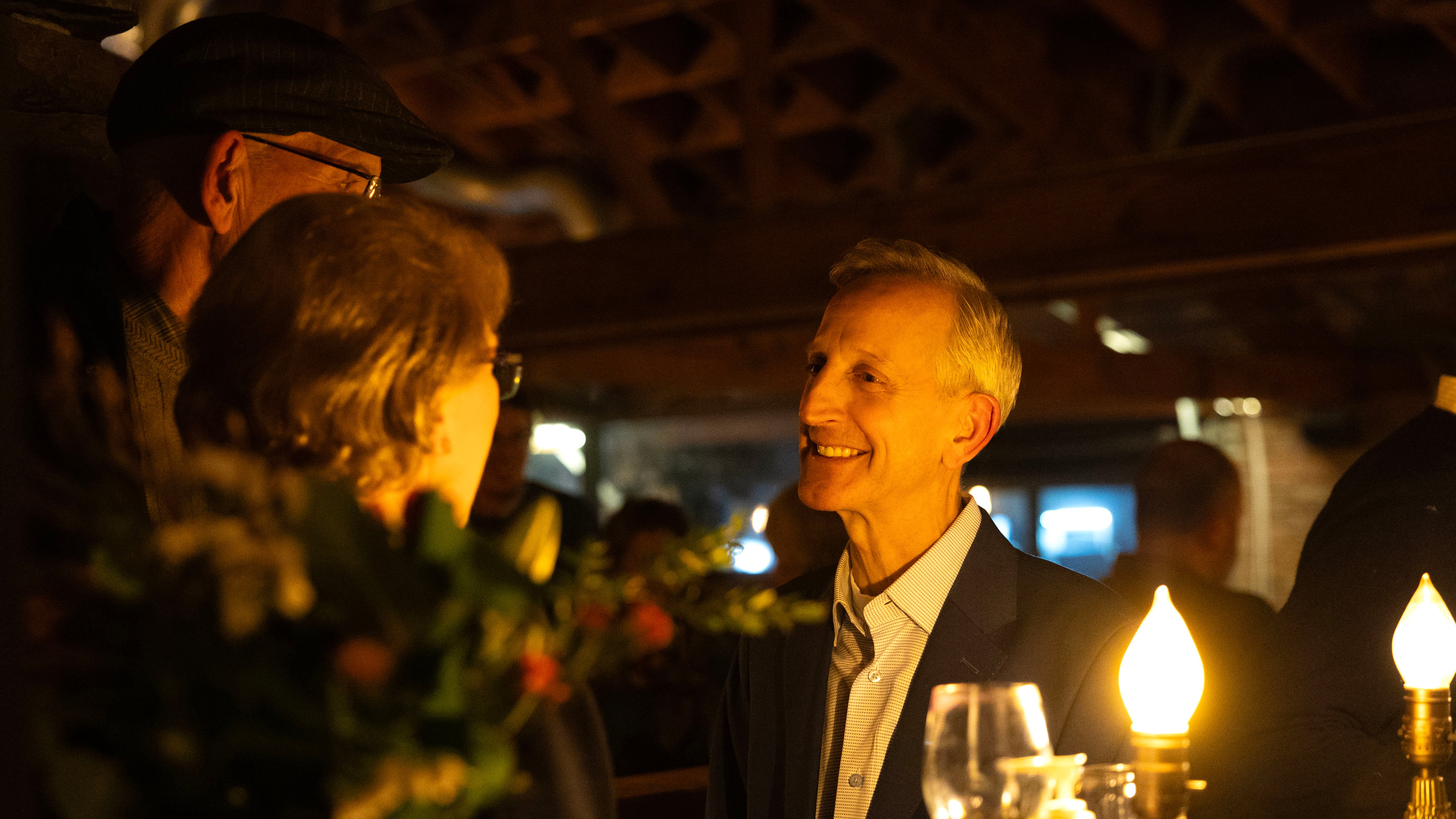Portland Mayor Keith Wilson won the 2024 election running on one promise: ending unsheltered homelessness by 2026. His unabashed determination to reach what longtime politicos said was an unattainable goal resonated in a city that has seen the number of people sleeping on the streets rise steeply over the past decade.
Since he took office, most of the spotlight has been on the piece of Wilson’s plan that’s most public-facing: opening nighttime shelters across the city in churches, vacant storefronts, and old office buildings. He’s opened four city-run shelters so far and is close to opening another two—while receiving the customary backlash from those living close by.
But another tentpole of the mayor’s plan to end unsheltered homelessness has received less attention. Perhaps that’s because it doesn’t require obtaining physical spaces in neighborhoods tired of tents.
The mayor is giving unhoused people bus and plane tickets to travel back to their loved ones out of town.
Wilson calls it “reunification”—arranging homecomings for people with families and friends in their cities of origin. At a July 28 town hall in the Pearl District, Wilson waxed enthusiastic about the strategy.
“The lowest cost form of housing is connecting someone with their family,” Wilson said. “Starting Dec. 1, I expect 14 people per week to be reunified, 700 people next year to be reunified. I know because they do it in Boston, they do it in Phoenix, and it works.”
As is typical of the mayor, Wilson gave a precise number—14 people a week—without explaining how he had arrived at it. If he’s right, the practice would make a meaningful dent in Portland’s numbers. Multnomah County counted 7,541 people unsheltered in July, which makes 700 a 10% reduction.
So far this year, the city has reunified 53 people with family members or friends out of state. That number comes from Rob Layne, spokesman for an office called Portland Solutions that runs point on homelessness for the mayor. The city has purchased nine flights and over a dozen bus tickets to states in every corner of the country, including North Carolina, Oklahoma, Washington, California, New York, Arizona and Florida (see chart below). It has spent $7,981 on travel costs—with tickets ranging from $22 to $1,417, according to a city spreadsheet Layne shared with WW.
Wilson’s plan to reunify more than a dozen people a week with relatives in other states goes hand in hand with the mayor’s ultimate goal to shelter every single unhoused person by December 2025, but it’s been far less scrutinized—perhaps because they are persons in distress going out of state rather than moving into a neighborhood near you.
But a closer examination suggests that in some regards, Wilson is not following best practices that other cities have employed to ensure people stay housed when they move back home. In particular, Portland breaks from other city’s programs by largely ceasing contact after a person arrives in their new town.
Layne defends the scope of the city’s work. “We remain confident that following best practices of conducting warm handoffs to family, friends and community is critical to ensuring long-term success for reunification participants,” he tells WW. “The city’s program is not a ticket out of town, it’s a connection to family and ticket home to meet them.”

Reuniting unhoused people with their loved ones in other places is not a novel idea in Portland: Multnomah County has contracted with the nonprofit Transition Services to run a program covering such travel costs since at least 2016. But Wilson is talking about shifting the strategy into overdrive.
In stumping for his approach, Wilson points to data from the county’s annual point-in-time count that shows 26% of respondents who answered a question about where they were last housed said they were already homeless when they moved to Portland from out of state. (Whether Portland attracts homeless people from elsewhere because of its abundance of homeless services is a matter of great contention among both current and former elected officials.)
He has also offered emotional anecdotes. One such touching story Wilson shared widely on his social media channels was of a formerly houseless man named Giovanni who was returned to his home in Brooklyn, N.Y. A friend accompanying Giovanni to his mother’s apartment in Brooklyn captured the reunion in a shaky video published by the mayor’s office in an April press release. The video showed Giovanni’s mother crying with joy as she embraced him.
The mayor’s office touted it as an example of just how quickly the city could reunify someone with a family member if the person wanted that reunion. Wilson said in a KGW-TV interview about Giovanni’s tale that it was “one of the more heartwarming stories” he could recall.
City Shelter Services would not provide contact information for the Brooklyn man, saying “Giovanni needs some space and privacy for the time being.”
It’s hard to know whether the people the mayor’s office has reunited with loved ones in other states have remained housed. That’s because the city stops tracking and checking on them as soon as they arrive at their destination, and once they’re picked up at the airport or bus or train station.
The city says it’s because officials don’t want to overstep once the person has left.
“These are individuals who simply want to go back and live with their family or friends and need help doing so,” Layne says. “We don’t intrude on their life after that.”
But such a hands-off approach, say homelessness experts who practice reunification in other cities, has its risks. Those experts say the key to reunification is ensuring that the person has the resources to remain housed in their town of origin. That could look like a grocery stipend or rent assistance; a case worker helping to replace a lost ID; or connecting them to local resources.
Jack Hardin is chairman of the United Way Regional Commission on Homelessness, based in Atlanta. At the behest of then-Atlanta Mayor Shirley Franklin in 2002, Hardin fundraised for and opened the Gateway Center, a massive shelter at the site of a former jail.
Upon clients’ admission to the shelter, Gateway case managers ask them where they come from, what their relationships with their family are, and if there is anyone that might be willing to take them in. If there is, the case manager contacts the family member. If a relative is willing to take a person in—case managers have a few thousand dollars at their disposal for rent assistance or other financial support—the case manager facilitates the reunion.
Once a person is reconnected with family, the case manager stays in touch with them for a year to ensure they have everything they need. It’s only after a year’s worth of regular check-ins that the case manager ceases contact.
“It doesn’t mean sending someone from Atlanta back to Portland,” Hardin tells WW. “It doesn’t just mean sending them home. And then follow up. We follow up periodically for a year.”
Hardin says case managers are expected to take the success of a person seriously after they leave Atlanta.
“You own this person’s success until they’re successful or until you’ve had a warm handoff to someone who says, ‘I got it from here,’” Hardin says. “The idea for our case managers is, this is your problem. You own it.”
Jessica Berg, chief program officer for St. Vincent de Paul in Phoenix, oversees a similar program there. She says Phoenix utilizes a database to stay up to date on where reunified individuals are. It also checks the Maricopa County data system to see if people have returned to Phoenix.
“After two years,” Berg says, “for all of those whom we help to rehouse locally or send to another city for reunification, 93% are not in the system.”
Amy Schwabenlender, who works for the Phoenix nonprofit Keys to Change, does outreach on the other end of reunification, making sure that formerly homeless individuals stay housed. “Staff call the person that they would be reunifying with to ensure that this will be a successful reunification,” Schwabenlender says. “If assistance is provided, then staff follow up at 60 to 90 days. More than 85% of people assisted do not return to homelessness.”
The last contact Wilson’s office has with a person is ensuring they’ve made contact with a social worker or clergy member at their city of origin. Once that’s been confirmed, the city doesn’t proactively reach out to the person again.
Layne says Portland doesn’t have the resources to do more.
“The scope of the homelessness problem in Portland is one of the largest in the country,” he says. “It requires intense outreach to make headway with individuals that have high acuity, are experiencing severe behavioral, mental, and/or addiction issues, as well as those that are particularly service resistant. Although we would like to maintain contact in a more formal way, our outreach team needs to triage more emergent and proximal issues during this crisis.”
City Councilor Candace Avalos says she would like to see Wilson’s office give additional support to people arriving in their towns of origin. She sees reunification as a tool that can work in certain circumstances. “I do not think we should anchor our policy on it,” she adds, “because I think there’s a broader concept here about reunification that we need to get super clear about: A lot of people, especially those from the LGBTQ community, end up homeless due to being kicked out by their own family.”

